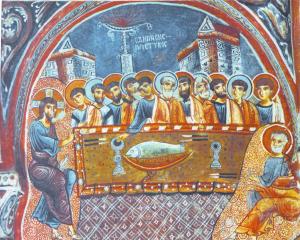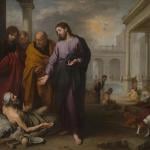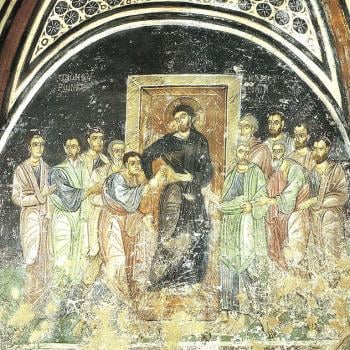
I’m a vegetarian. While I often tell people the reason why I became vegetarian was for the health benefits, and that certainly is one of the reasons, I have also had philosophical, moral, and even religious reasons which led me to live out such a life choice. Ultimately, it became a matter of following my personal conscience. The more I understood evolution, and the close relationship humanity has with the rest of the animal world, the more I realized how close they were to us in the great chain of being, a closeness which reveals itself in the way many of them show evidence not only of sentience but rationality. Upon realizing this, I came to believe we had a greater duty to honor and respect them. I was also influenced by saints, like St. Francis of Assisi, and philosophers, like Porphyry, who raised questions concerning our relationship with the rest of the animal world, questions which I took seriously and led me to my own particular answers, answers which then became the foundation for my conscience and the way it directs me to be a vegetarian.
Now, I have always chosen to deal with my vegetarian ideals in a non-legalistic manner, understanding the needs of others, and the context in which they are found, will determine if they can even be a vegetarian, let alone consider it as an ethical option. That is, as with all moral considerations, there is a practical dimension which must be taken into consideration, and with all such considerations, the notion of economia plays an important part.
Now, while I will sometimes discuss various aspects of my thoughts on animals, including some which have helped lead to my vegetarian lifestyle, I try to do so in the proper context, such as in my personal reflections which others are free to read or ignore. I do not believe it helpful to be a so-called “militant” vegetarian, one who tries to force their choice upon others, punishing them in some way if they do not. If people ask me about my vegetarianism in relation to Christianity, and how Christianity has denied requiring everyone to be vegetarian, I will point out the non-legalistic nature of my vegetarianism and explain that such rejections of legalism is, in part, the foundation for the way Christianity deals with the question as a whole (following the way Paul talks about the eating of food). I will, however, also show how many, including saints, have suggested a vegetarian way of life not only is a more holy way of life, but the ideal, an ideal which they thought would be realized in the eschaton. Finally, if someone would ask about Jesus, and the way Jesus apparently ate meat, both before and after his resurrection from the dead, I will point out that Christian vegetarians have found ways to read the texts to suggest things are not always as clear as they appear.
However, there has always been another way I have thought about such passages, an intuition, as it were, which I have not completely worked out, and yet an intuition which I think might even better explain such passages, and it is an intuition which has me consider what Jesus is doing if he eats animal flesh: he is taking the animals, which are already dead, and brings them into himself, into his body, making them a part of him. If it becomes a part of him, would that not mean something, because is that not what is said to happen to us when we are baptized? Thus, I wonder if there might not be some sort of sacramental dimension involved, some mystery going on, when Jesus ate, a dimension which opens up a way for many, and not just humanity, to be incorporated into Christ. I also wonder if there is not also some sort of eucharistic element involved with the action, that there is some element of communion going on when Christ ate.
Baptism incorporates us into the body of Christ. The eucharist has us partake of Jesus, but in a way, it can also be said to have Jesus partake of us, showing how we are one, and not just one with Jesus, but one with everyone else in the body of Christ. Our incorporation into the body of Christ allows us to share in and experience the glory of the resurrection and the divine life for ourselves. Jesus takes us in and makes us a part of himself. In the eucharist, Jesus is food for us, but in a way, we can be said to offer ourselves, all who we are, over to Jesus, so that Jesus can also be said to be taking us in himself and transform us in and through communion, similar to the way Jesus transforms the gifts of bread and wine, so that we find the realization of what it means to be incorporated into his body by our reception of the eucharist. Not only do we become what we eat, in the process of giving ourselves to Christ, we become, as it were, food as well, as we die to the self in order to find ourselves transformed and made alive in Christ. It is by being incorporated into Christ in baptism, and by allowing ourselves to be taken in by him and transformed throughout to fully become, inside and out, a part of his mystical body, we become participants in his resurrection from the dead, given, that is, true life.
If, by becoming incorporated into the body of Christ, we find ourselves being transformed into the body of Christ, and in doing so, find our true life, why do we think this is true only for us? Should not everything which becomes incorporated into him, become a part of him and share in who and what he is? If that is the case, should that not be what is happening when he eats, so that what he eats becomes a part of him, and in doing so, becomes transformed so it participates in his life? That which is dead is brought back to life in him. If we truly believe our own resurrection from the dead flows from the way we become incorporated in him, and with it, our glorification, how can we deny this to those who become a part of his body when he eats? This, of course, would suggest there is something different going on with Jesus and the way he eats than what happens with us, at least in the present situation (though not entirely different from what happens with communion).
It is here that I think more exploration needs to be done. I think we need to contemplate the kind of relationship we can find between our own sacramental participation in Christ, and the way we give ourselves over to Jesus in the sacraments, with food. I know some who have explored this issue; I once saw a book on the topic, I Am Food: The Mass In A Planetary Perspective, a book which I didn’t buy at the time, as it was soon after I became Catholic and I found it an odd title, but now I wish I did. I have, from time to time, hinted at this concept in my writings, especially in relation to the eucharist, but I have only kept the notion on a subtle, and simple, level. I think one of the reasons why I have done this is because I fear this intuition can be abused, and if it can be abused, would be abused (because some might try to suggest what is true for Christ, is true for them, that by eating meat, they bring animals to a new form of life, but that would ignore the point that it is because of Christ, and who and what he is, that makes a difference). And so, this remains, at least for now, a collection of intuitions which seem to work together, a series of intuitions which I ponder from time to time, and which influence some of the things I write about, but nonetheless, a series which could be and should be explored in greater depth someday.
* This Is Part LVIII Of My Personal (Informal) Reflections And Speculations Series
Stay in touch! Like A Little Bit of Nothing on Facebook.
If you liked what you read, please consider sharing it with your friends and family!
N.B.: While I read comments to moderate them, I rarely respond to them. If I don’t respond to your comment directly, don’t assume I am unthankful for it. I appreciate it. But I want readers to feel free to ask questions, and hopefully, dialogue with each other. I have shared what I wanted to say, though some responses will get a brief reply by me, or, if I find it interesting and something I can engage fully, as the foundation for another post. I have had many posts inspired or improved upon thanks to my readers.













